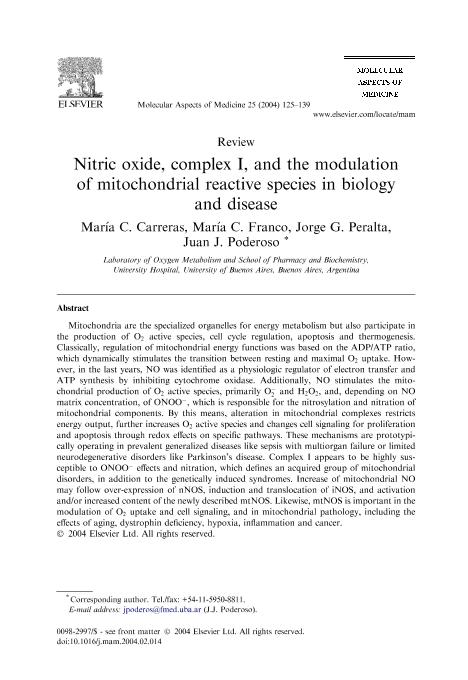Artículo
Nitric oxide, complex I, and the modulation of mitochondrial reactive species in biology and disease
Fecha de publicación:
02/2004
Editorial:
Elsevier Science
Revista:
Molecular Aspects Of Medicine
ISSN:
0098-2997
Idioma:
Inglés
Tipo de recurso:
Artículo publicado
Clasificación temática:
Resumen
Mitochondria are the specialized organelles for energy metabolism but also participate in the production of O2 active species, cell cycle regulation, apoptosis and thermogenesis. Classically, regulation of mitochondrial energy functions was based on the ADP/ATP ratio, which dynamically stimulates the transition between resting and maximal O2 uptake. However, in the last years, NO was identified as a physiologic regulator of electron transfer and ATP synthesis by inhibiting cytochrome oxidase. Additionally, NO stimulates the mitochondrial production of O 2 active species, primarily O2- and H 2O2, and, depending on NO matrix concentration, of ONOO-, which is responsible for the nitrosylation and nitration of mitochondrial components. By this means, alteration in mitochondrial complexes restricts energy output, further increases O2 active species and changes cell signaling for proliferation and apoptosis through redox effects on specific pathways. These mechanisms are prototypically operating in prevalent generalized diseases like sepsis with multiorgan failure or limited neurodegenerative disorders like Parkinson's disease. Complex I appears to be highly susceptible to ONOO- effects and nitration, which defines an acquired group of mitochondrial disorders, in addition to the genetically induced syndromes. Increase of mitochondrial NO may follow over-expression of nNOS, induction and translocation of iNOS, and activation and/or increased content of the newly described mtNOS. Likewise, mtNOS is important in the modulation of O2 uptake and cell signaling, and in mitochondrial pathology, including the effects of aging, dystrophin deficiency, hypoxia, inflammation and cancer.
Archivos asociados
Licencia
Identificadores
Colecciones
Articulos(INIGEM)
Articulos de INSTITUTO DE INMUNOLOGIA, GENETICA Y METABOLISMO
Articulos de INSTITUTO DE INMUNOLOGIA, GENETICA Y METABOLISMO
Citación
Carreras, Maria Cecilia; Franco, María Clara; Peralta, Jorge Guillermo; Poderoso, Juan José; Nitric oxide, complex I, and the modulation of mitochondrial reactive species in biology and disease; Elsevier Science; Molecular Aspects Of Medicine; 25; 1-2; 2-2004; 125-139
Compartir
Altmétricas




